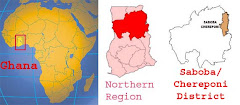Before coming here I had a typical development oriented state of mind. Idealistic, socialist, thinking that the government should manage all to prevent such a stratified class system. I believed that a capitalist society was one that was selfish by nature, based on a dog-eat-dog world. Competition to get the top.
I’ve realized with my short stay a bit of the “cost” of my idealistic dream of a world - where there would be no disparity and everyone would live equally. I call it “cost” because depending on what stance you look at it from, it might not be a cost.
What I’m referring to is the collective lifestyle that I see being lived by the majority of Ghanaians I interact with. It’s inspiring to me, because there is such a sense of community here that people do truly help out their neighbours, and welcome each other. Generosity here is exemplified in so many actions, it gives the word new meaning.
It’s painted all over the cultural subtleties I see everyday. When someone you know is sick in the hospital, despite the faint connection you have to them, Ghanaians will go to visit. When people come to randomly visit you, maybe at work or at home; you make time no matter what you are doing, welcome them in, offer them food, and converse for a short while. Anytime somebody is eating and a friend is walking by, even an acquaintance, “you are invited” is the phrase to indicate that the food should be shared.
This culture of sharing and taking time for others, completely contrasts North American living. What I’ve come to notice though, is while this same sharing provides the safety net that so many vulnerable people rely on, it also stifles the advancement of any one individual in society.
Steven is the name of a friend I have in Tamale who has started his own business of selling cell phones and cell phone accessories. He also owns a taxi that he has a driver operate to generate some extra income. Steven’s story provides hope, because a hard working individual has become an entrepreneur, which is such a popular sequence of events here in
Though as soon as Steven starts to advance, as soon as he starts to save some money, siblings, family, and friends come knocking. The reasons are great, from somebody needing money for medication to school fees for a child. This makes saving for an entrepreneur like Steven difficult, because there is such a need to supply coming from close friends and family.
The same can be seen even more in rural communities. Farmers are constantly knocking on each other’s door, and sharing when somebody’s harvest comes in small. This makes it so hard for any one person to advance their livelihood. Just yesterday I went farming with my host father Elijia, and after losing the majority of his cassava plantation to indiscriminate goat grazing, he was re-stocked by a neighbouring farmer. Amazing that a subsistence farmer would so readily share his crops with a fellow farmer, but it doesn’t bode well for the generous farmer ever escaping subsistence.
What this shows to me is a collective mentality to get through. In both these cases, there is a sense of others over self. Perhaps it is a no-brainer for farmers because they can empathize with eachother, and share a common hardship. Initiatives such as communal labour (see 10 things I love about
So the result is that community development is somewhat stagnant in most cases, or at least very slow. It is a realization that I’ve had, that with a collective lifestyle, development interventions are diluted among the masses, and from a short-time frame it would seem that development is static.
The question I’m left with is how collective can you be before it is a bad thing? At what point should somebody say no to a friend or a friendly member so that the individual can advance their livelihood and provide for their children? How effective can micro-enterprise initiatives be when loan repayment is so unlikely with this collective system? I constantly see what I would naturally call bad business men, who will continually sell below production or give out freebies to their friends, and here people have a lot of friends.
I’m not sure of the income distribution in



No comments:
Post a Comment